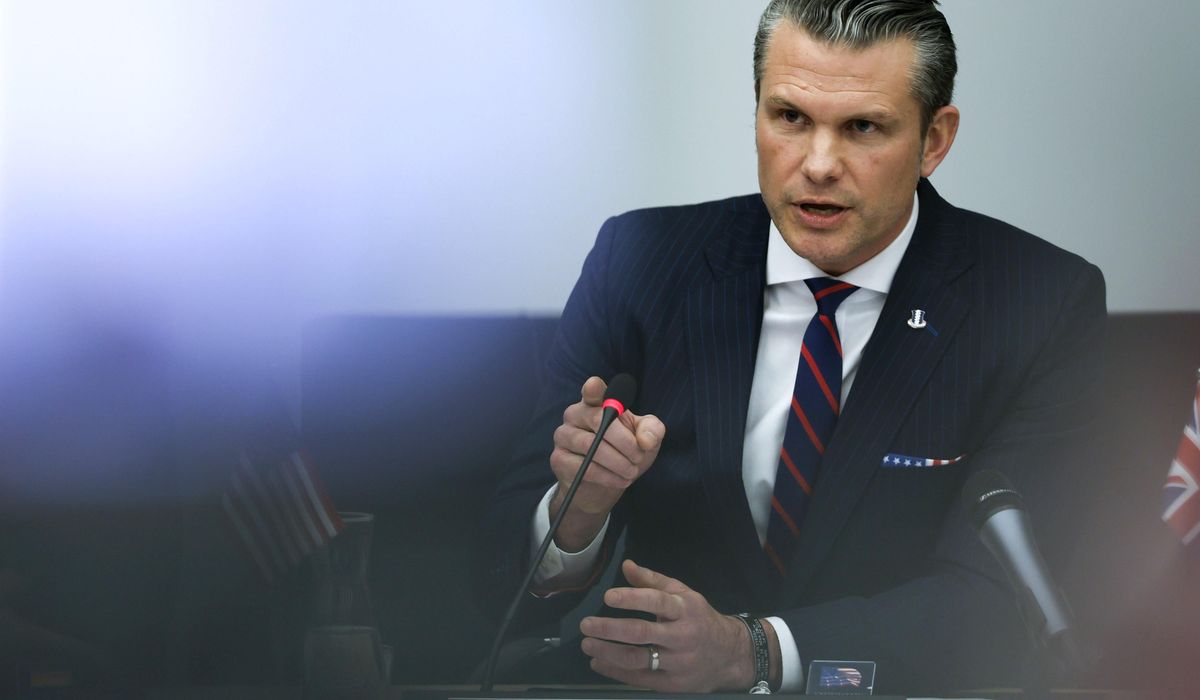


Secretary of Defense Pete Hegseth used his first trip to Europe Wednesday to underscore President Trump’s push for an end to the war in Ukraine, but told NATO leaders that the U.S. would not send troops for any future peacekeeping operations.
Mr. Hegseth provided a blunt assessment of the Trump administration’s security priorities while in Brussels for a meeting of the Ukraine Defense Contact Group, a group of some 50 allies and partners set up under the Biden administration to support Kyiv following Russia’s 2022 invasion.
“President Trump has been clear with the American people and many of your leaders: Stopping the fighting and reaching an enduring peace is a top priority,” he said. “We will only end this devastating war and establish a durable peace by coupling allied strength with a realistic assessment of the battlefield.”
A return to Ukraine’s pre-2014 borders — before Russian President Vladimir Putin unilaterally annexed Crimea — would be an “unrealistic objective,” Mr. Hegseth said.
“Chasing this illusory goal will only prolong the war and cause more suffering,” he said.
A durable peace for Ukraine must include robust security guarantees to ensure that more fighting won’t erupt in the future. However, Mr. Hegseth said NATO membership for Kyiv, a goal long pushed by Ukrainian President Volodymyr Zelenskyy as a guarantee against future Russian aggression, isn’t a “realistic outcome of a negotiated settlement.”
Future security guarantees must be backed up by European and non-European military forces, but they should not be there as part of a NATO operation, Mr. Hegseth said, adding that the U.S. will not put “boots on the ground” in Ukraine.
“Safeguarding European security must be imperative for European members of NATO,” he said. “Europe must provide the overwhelming share of future lethal and non-lethal aid to Ukraine.”
Before the new U.S. defense chief spoke, NATO Secretary General Mark Rutte told The Associated Press that Russia’s Mr. Putin will only negotiate a peace deal with Ukraine if Kyiv’s backers continue to provide enough weapons and ammunition.
“We have to make sure that he has no other option, and that means to force him to the table,” Mr. Rutte said. “He needs to understand that we will not give up on Ukraine. We have to make sure that we have maximum economic impact on Russia.”
Over nearly three years, the Contact Group countries have collectively provided Ukraine with more than $126 billion in weapons and military assistance, including more than $66.5 billion from the U.S., which has served as the chair of the group since its creation, the AP reported.
Mr. Hegseth said “stark strategic realities” prevent the U.S. from being primarily focused on the security of Europe. The Trump administration is focusing on the security of U.S. borders where Mr. Hegseth claimed it faces “consequential threats” to the homeland.
“We also face a peer competitor in the communist Chinese with a capability and intent to threaten our homeland and core national interests in the Indo-Pacific,” Mr. Hegseth said.
The Trump administration will increase energy production and encourage other countries to do the same to drive down energy prices that fund the Russian war machine. The strategy will enable effective diplomacy and help bring Moscow to the negotiation table, Mr. Hegseth argued.
The U.S. is primarily focused on deterring war with China, recognizing the “reality of scarcity” that means European allies must lead from the front in Europe, he said.
“Together, we can establish a division of labor that maximizes our comparative advantages in Europe and the Pacific,” Mr. Hegseth said.
Despite concerns in European capitals about Mr. Trump’s foreign policy priorities, the United States remains committed to the NATO alliance and the defense partnership with its European allies, Mr. Hegseth insisted. The transatlantic alliance has endured for decades and will continue,he said.
However, “the United States will no longer tolerate an imbalance relationship which encourages dependency. Our relationship will prioritize empowering Europe to own responsibility for its own security,” he said. “Honesty will be our policy going forward, but only in the spirit of solidarity.”
NATO leaders are expected to agree on new spending targets at their next planned summit in The Hague, Netherlands, on June 24 to 26.
• Mike Glenn can be reached at mglenn@washingtontimes.com.
